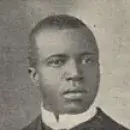
Scott Joplin
Scott Joplin was a composer and pianist who popularized the genre of ragtime music–typically piano-based songs distinguished by their syncopated beat–at the turn of the twentieth century, for which he has been dubbed “The King of Ragtime.” He composed more than forty ragtime pieces, a ballet, and two operas. Among his most popular pieces is the “Maple Leaf Rag” and “The Entertainer.”
Born in Arkansas, Joplin traveled the South in the 1880s as an itinerant musician and visited Chicago for the World’s Columbian Exhibition of 1893, where he helped make ragtime a national craze. By the early 1900s, ragtime was dominating music publishing. Joplin studied music at George R. Smith College in Missouri and played with several ensembles, among them the Queen City Cornet Band. He opened his own piano studio and taught and mentored other composers, including Arthur Marshall and Scott Hayden.
The form of rag in Joplin’s compositions is considered “classic,” a term that he and John Stark, his major publisher, employed to market their sheet music. He saw ragtime as a form of classical music meant to be played in concert halls. Joplin’s theory of ragtime is articulated in his self-published School of Ragtime (1908). The score of his first opera, A Guest of Honor (1903), was confiscated for non-payment of debts and is considered lost. Joplin’s music was rediscovered in the early 1970s with the release of a popular album recorded by Joshua Rifkin, followed by the Academy Award–winning 1973 film The Sting, which featured several of Joplin’s compositions. Treemonisha, his second opera that he was unable to stage in his lifetime, was first presented in 1972 and since staged throughout the world.